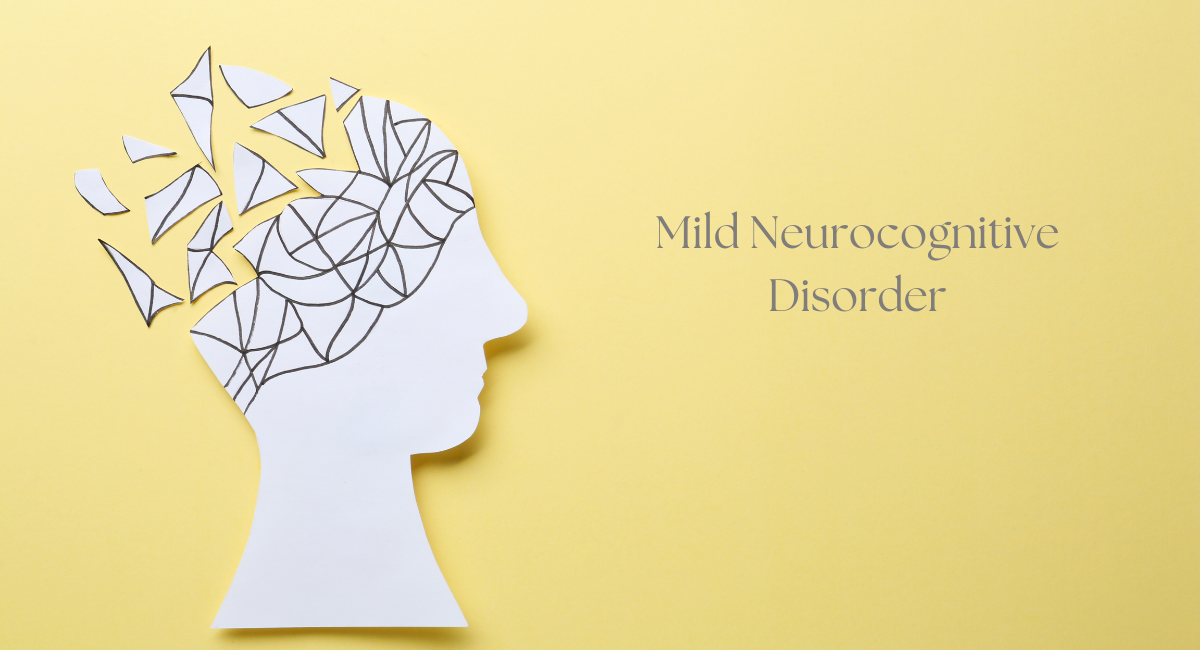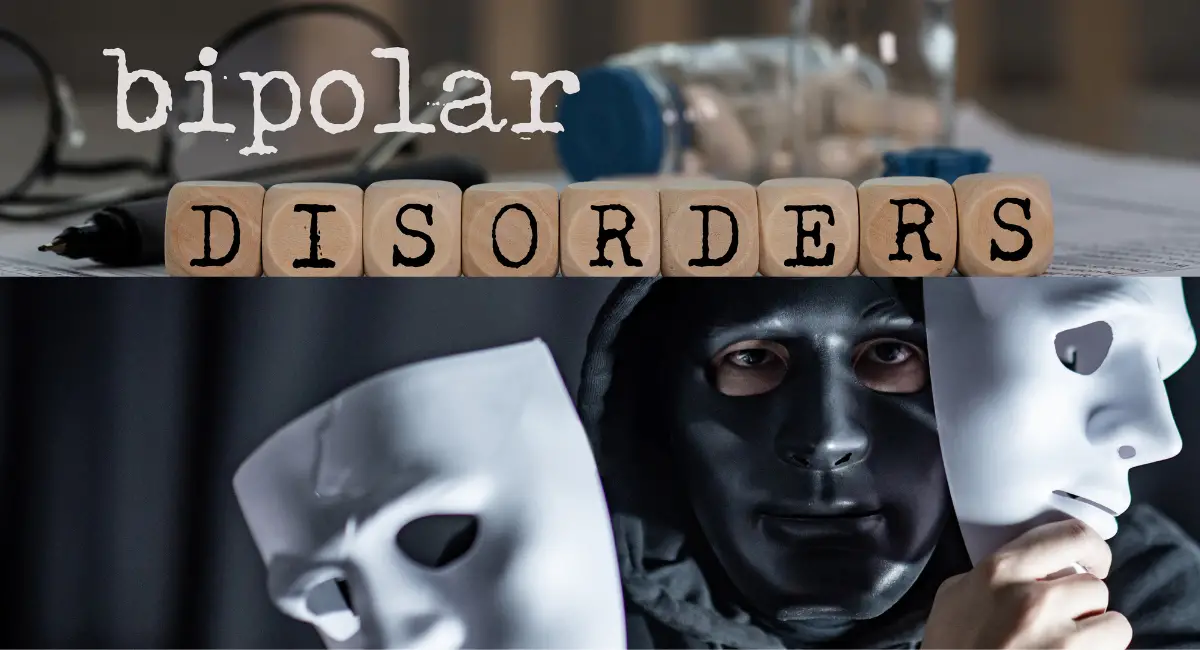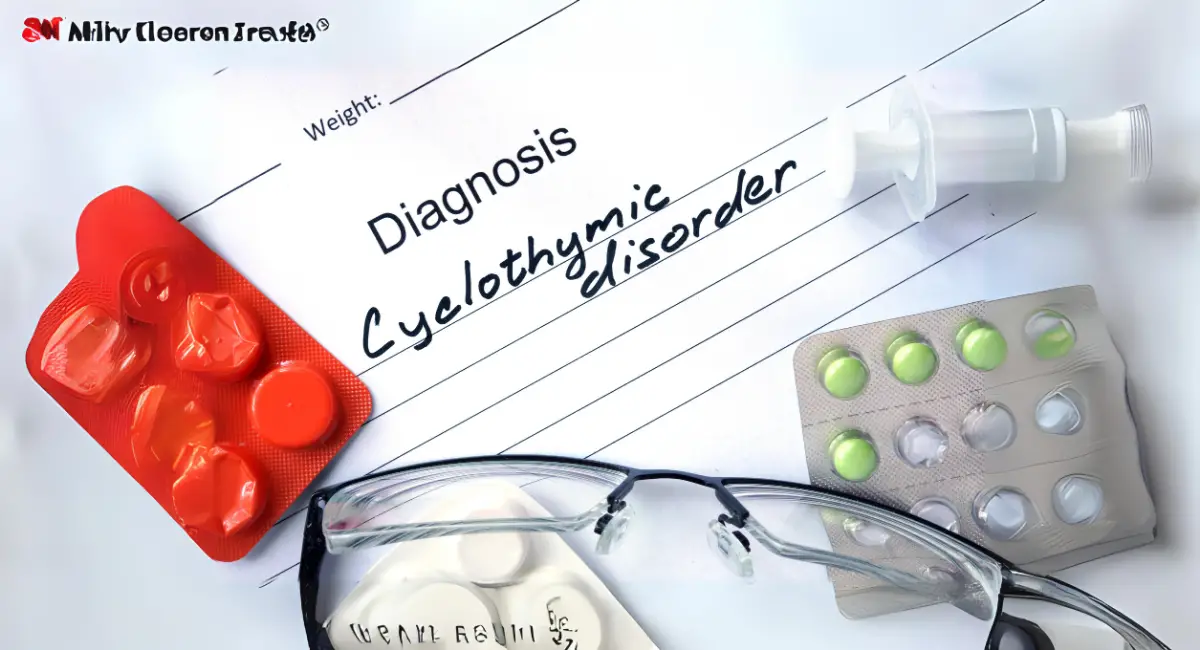
Mild Neurocognitive Disorder: Symptoms, Causes, and Therapy Options
Contents
Introduction
Mild Neurocognitive Disorder (Mild NCD) is characterized by a modest decline in cognitive abilities, including memory, attention, executive function, and language skills, that is noticeable but does not yet interfere with a person’s ability to carry out everyday activities independently. Unlike Major Neurocognitive Disorder (commonly known as dementia), individuals with Mild NCD can maintain independence, though they may require more effort or compensatory strategies to manage their tasks.
The Diagnostic and Statistical Manual of Mental Disorders, Fifth Edition (DSM-5) recognizes Mild Neurocognitive Disorder as an early stage of cognitive impairment that may progress to Major NCD. This article explores Symptoms, Causes, and Therapy Options for Mild Neurocognitive Disorder, with a focus on specific disorders such as Amnestic Disorder and Mild Cognitive Impairment (MCI).
Symptoms of Mild Neurocognitive Disorder
The symptoms of Mild Neurocognitive Disorder are less severe than those of Major NCD but still involve noticeable cognitive decline. Below is a table outlining common symptoms of Mild NCD and examples of how they manifest:
| Symptom | Description/Example |
|---|---|
| Memory Problems | Difficulty remembering recent events or information, such as forgetting appointments or misplacing objects. For example, someone might frequently lose their keys. |
| Attention Deficits | Trouble focusing or maintaining attention on tasks. For instance, an individual might struggle to stay focused during conversations or while reading. |
| Executive Function Impairments | Difficulty planning, organizing, or multitasking. For example, someone may find it harder to plan a trip or follow multiple steps in a recipe. |
| Language Difficulties | Mild problems with finding words or understanding spoken or written language. For instance, someone might pause frequently when trying to think of the right word. |
| Mood Changes | Increased irritability, anxiety, or apathy, potentially due to awareness of cognitive decline. |
| Spatial Awareness Issues | Difficulty with navigation or visual-spatial tasks. For example, someone might struggle to judge distances or directions when driving. |
Types of Mild Neurocognitive Disorder
There are two major types of Mild Neurocognitive Disorder: Amnestic Disorder and Mild Cognitive Impairment (MCI). Both involve noticeable cognitive changes, though the specific areas affected can vary depending on the individual and the underlying cause.
1. Amnestic Disorder
Amnestic Disorder is characterized by a significant impairment in memory function, while other cognitive domains may remain largely intact. Individuals with Amnestic Disorder have difficulty recalling recent events or learning new information, although they may retain long-term memories.
- Amnestic Disorder is caused by damage to the brain’s memory-related regions, particularly the hippocampus, which is critical for forming and retrieving memories.
- Causes include brain trauma, stroke, thiamine deficiency (often associated with chronic alcohol use), or neurodegenerative diseases such as Alzheimer’s Disease.
John, a 60-year-old man, developed Amnestic Disorder after suffering a stroke that affected his hippocampus. He struggles to remember recent conversations but can recall events from his childhood with relative ease.
2. Mild Cognitive Impairment (MCI)
Mild Cognitive Impairment (MCI) is a condition where individuals experience noticeable cognitive decline that is greater than expected for their age but does not yet meet the criteria for Major NCD. The most common type is amnestic MCI, where memory is the primary area affected, though non-amnestic MCI can involve other cognitive domains, such as attention or language.
- MCI often represents an intermediate stage between normal cognitive aging and Alzheimer’s Disease or other forms of Major NCD. However, not all individuals with MCI progress to dementia—some may remain stable or even improve.
- MCI is linked to several risk factors, including age, genetic predisposition (particularly the APOE-e4 allele), cardiovascular health, and lifestyle factors like physical inactivity and poor diet.
Mary, a 72-year-old woman, was diagnosed with MCI after her family noticed she frequently forgot recent conversations and appointments. While her memory lapses were concerning, she was still able to manage her daily activities independently.
Causes and Risk Factors of Mild Neurocognitive Disorder
Mild Neurocognitive Disorder can result from a variety of causes, including genetic, biological, and lifestyle factors. Early diagnosis is crucial in identifying the underlying cause and slowing cognitive decline.
Major causes that we will discuss, include: Genetic and Biological Factors, Psychological and Lifestyle Factors, Environmental Factors:
1. Genetic and Biological Factors
Genetic predisposition plays a key role in the development of Mild NCD, particularly in individuals with a family history of neurodegenerative disorders. For example, the APOE-e4 allele increases the risk of developing Alzheimer’s Disease and its precursor, MCI.
- APOE-e4, a gene variant linked to Alzheimer’s Disease, increases the likelihood of developing MCI as well. This gene affects how the brain processes beta-amyloid, a protein that forms plaques in the brains of individuals with Alzheimer’s.
- Hippocampal atrophy (shrinkage of the brain’s memory center) is often seen in individuals with MCI and predicts progression to Alzheimer’s Disease.
John, diagnosed with Amnestic Disorder, carries the APOE-e4 allele, putting him at higher risk for developing Alzheimer’s Disease in the future.
2. Psychological and Lifestyle Factors
Lifestyle choices such as diet, physical activity, and cognitive engagement play a significant role in the onset of Mild NCD. Individuals who engage in regular exercise, maintain a healthy diet, and remain socially active tend to have better cognitive health as they age.
- Exercise has been shown to promote brain health by increasing blood flow to the brain, encouraging the growth of new neurons, and improving synaptic connections. These effects help delay the onset of cognitive decline in individuals with MCI.
- Cognitive engagement through activities like reading, learning new skills, and socializing promotes neuroplasticity (the brain’s ability to reorganize itself), which can delay or prevent the onset of Mild NCD.
Mary, who has a sedentary lifestyle and spends little time engaging in mentally stimulating activities, may have accelerated her development of MCI due to the lack of physical and mental stimulation.
3. Environmental Factors
Certain environmental factors, such as head injuries or exposure to toxins, can contribute to the development of Mild NCD. Traumatic Brain Injury (TBI) is a well-known risk factor for Amnestic Disorder and cognitive decline later in life
- TBI, whether caused by a single severe injury or repeated mild injuries (as seen in athletes), can result in long-term cognitive impairment due to damage to brain tissue, particularly in memory-related areas like the hippocampus.
- Exposure to environmental toxins such as heavy metals or pesticides has also been linked to cognitive decline, as these substances can damage neurons and disrupt brain function over time.
John’s Amnestic Disorder was linked to a traumatic brain injury he sustained in a car accident, which damaged his hippocampus and left him with significant memory problems.
Therapy and Treatment Options for Mild Neurocognitive Disorder
Although there is no cure for Mild Neurocognitive Disorder, several treatment options can help manage symptoms, slow cognitive decline, and improve quality of life. These options include Cognitive Behavioral Therapy (CBT), Cognitive Rehabilitation, medications, and lifestyle modifications.
1. Cognitive Behavioral Therapy (CBT)
Cognitive Behavioral Therapy (CBT) is commonly used to help individuals manage the psychological effects of Mild NCD, such as anxiety, depression, and frustration about cognitive decline. CBT can also teach compensatory strategies for managing memory and attention deficits.
- CBT helps individuals with MCI or Amnestic Disorder cope with the emotional challenges of cognitive decline by addressing negative thought patterns and fostering a more positive, adaptive mindset.
- CBT can also involve memory-enhancing strategies, such as using mnemonics, creating routines, and organizing tasks into manageable steps.
Mary, who had been diagnosed with Mild Cognitive Impairment (MCI), participates in cognitive-behavioral therapy (CBT) to help manage the anxiety and distress associated with her memory loss. MCI is characterized by noticeable memory problems that are more significant than typical age-related forgetfulness but not severe enough to meet the criteria for dementia
2. Cognitive Rehabilitation
Cognitive Rehabilitation focuses on improving or maintaining cognitive function through exercises that target memory, attention, and executive function. It can be particularly beneficial for individuals with MCI or Amnestic Disorder who are still capable of learning and applying new strategies.
- Cognitive Rehabilitation often involves brain training exercises, such as memory games, attention drills, and problem-solving tasks, aimed at strengthening cognitive skills and promoting neuroplasticity.
- This therapy also teaches individuals compensatory strategies, such as using notes, alarms, and calendars to keep track of tasks and appointments.
John, who has been diagnosed with Amnestic Disorder, works closely with his therapist on cognitive rehabilitation exercises designed to improve his memory and organizational skills. Amnestic Disorder involves significant memory impairment, often resulting from brain injury, illness, or other neurological conditions, and it can interfere with daily functioning.
3. Medications
There is currently no medication specifically approved for Mild NCD, but certain drugs used for Alzheimer’s Disease, such as cholinesterase inhibitors, may be prescribed to slow cognitive decline in individuals with MCI.
- Cholinesterase inhibitors like donepezil and rivastigmine are sometimes prescribed for individuals with MCI to enhance acetylcholine levels in the brain, a neurotransmitter associated with learning and memory. These medications are primarily used in the treatment of Alzheimer’s Disease but may help slow progression in those with MCI.
- Memantine, an NMDA receptor antagonist, is sometimes used in later stages of cognitive decline to regulate glutamate activity and prevent further neuronal damage.
Mary’s neurologist prescribed donepezil, a medication commonly used to slow the progression of Mild Cognitive Impairment (MCI). Donepezil works by increasing the levels of acetylcholine in the brain, a neurotransmitter important for memory and learning. While donepezil does not cure MCI, it can help slow its progression and improve cognitive functioning,
4. Lifestyle Modifications
Lifestyle modifications, including physical activity, mental stimulation, and a healthy diet, are critical for managing Mild NCD and potentially delaying the progression to Major NCD.
- Physical exercise has been shown to increase blood flow to the brain and support neurogenesis (the growth of new neurons), which can help maintain cognitive function. A combination of aerobic exercises, such as walking or swimming, and strength training is recommended.
- A Mediterranean diet, rich in fruits, vegetables, whole grains, and healthy fats (like omega-3 fatty acids), is associated with better brain health and a reduced risk of cognitive decline. Foods high in antioxidants, such as berries and leafy greens, also protect against oxidative stress in the brain.
John, diagnosed with Amnestic Disorder, begins to incorporate regular physical exercise and adopt a Mediterranean-style diet to improve his cognitive health. Amnestic Disorder, characterized by significant memory impairment, often impacts daily functioning and quality of life. Recognizing the importance of supporting his brain health.
Long-Term Management of Mild Neurocognitive Disorder
Long-term management of Mild Neurocognitive Disorder focuses on monitoring cognitive changes, maintaining brain health, and supporting emotional well-being. Key strategies for long-term management include:
- Regular Cognitive Assessments: Individuals with Mild NCD should undergo periodic cognitive testing to monitor any changes in cognitive function and adjust treatment strategies as needed.
- Lifestyle Adjustments: Engaging in physical activity, maintaining a healthy diet, and staying socially and mentally active can slow cognitive decline and improve overall quality of life.
- Continued Therapy: Ongoing participation in CBT or Cognitive Rehabilitation helps individuals manage the emotional and cognitive aspects of the disorder, improving their ability to cope with challenges.
Conclusion
Mild Neurocognitive Disorder represents an early stage of cognitive decline, often manifesting as Amnestic Disorder or Mild Cognitive Impairment (MCI). While the symptoms of Mild NCD do not yet interfere with daily life, they can cause noticeable challenges in memory, attention, and executive function. The causes of Mild NCD include genetic, biological, and environmental factors, with treatment options such as Cognitive Behavioral Therapy (CBT), Cognitive Rehabilitation, medications, and lifestyle modifications aimed at slowing cognitive decline and improving quality of life. Long-term management strategies focus on regular monitoring and maintaining brain health through a holistic approach.
References
- American Psychiatric Association. (2013). Diagnostic and statistical manual of mental disorders (5th ed.). American Psychiatric Publishing.
- Gauthier, S., Ritchie, C. W., & Blass, J. P. (2006). Mild cognitive impairment. Lancet, 367(9518), 1262-1270.
- Petersen, R. C. (2004). Mild cognitive impairment as a diagnostic entity. Journal of Internal Medicine, 256(3), 183-194.
- Petersen, R. C., Smith, G. E., & Waring, S. C. (2014). Mild cognitive impairment: Clinical characterization and outcome. Archives of Neurology, 71(10), 1269-1274.
- Smith, G. E., & Bondi, M. W. (2013). Mild cognitive impairment and dementia: Definitions, diagnosis, and treatment. Oxford University Press.
- Albert, M. S., DeKosky, S. T., Dickson, D., Dubois, B., & Snyder, P. (2011). The diagnosis of mild cognitive impairment due to Alzheimer’s disease: Recommendations from the National Institute on Aging-Alzheimer’s Association workgroups on diagnostic guidelines for Alzheimer’s disease. Alzheimer’s & Dementia, 7(3), 270-279.
- Mendez, M. F., & Cummings, J. L. (2003). Neuropsychiatric symptoms of dementia: A review of the literature. Journal of Clinical Psychiatry, 64(Suppl 9), 21-29.
- Carrillo, M. C., & Alva, G. (2013). Current concepts in dementia and neurocognitive disorders. Springer.
- Mitchell, A. J., & Shiri-Feshki, M. (2009). Rate of progression of mild cognitive impairment to dementia—meta-analysis of 41 robustly defined studies. Acta Psychiatrica Scandinavica, 119(5), 251-265.
- Blennow, K., & Zetterberg, H. (2018). Biomarkers for Alzheimer’s disease: Current status and future directions. Lancet Neurology, 17(3), 241-258.
Explore Other Mental Health Issues








